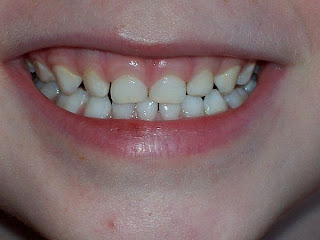
Willow is teething right now with her 4 k-9's getting ready to poke through in the next couple of weeks. After that we are awaiting the last 4 molars (hopefully with a break in between the k-9's and the molars) and we are DONE! I can't tell you how much I am looking forward to once again getting a full nights rest on a regular basis.
All that aside, I noticed that Willow has been grinding her teeth. She was doing it in the afternoon and in her sleep. So I wondered, is this normal? What could be causing it? Will it harm her in any way? Is there anything I can or should do about it?
According to BabyCenter, about half of young children grind their teeth at one point or another. This behavior usually starts around 10 months, when your child's front teeth - two on the top and two on the bottom - have come in. Teeth grinding can continue into toddlerhood and beyond. Some children grind their teeth all night long, while others do it off and on.

Turns out the technical term for grinding your teeth is called "Bruxism".
What is Bruxism? Bruxism is the medical term for grinding, gnashing or clenching your teeth. The condition affects both children and adults.
According to The Mayo Clinic, the Signs and Symptoms of Bruxism may include:
- Teeth grinding or clenching, which may be loud enough to wake your sleep partner
- Teeth that are worn down, flattened or chipped
- Worn tooth enamel, exposing the inside of your tooth
- Increased tooth sensitivity
- Jaw pain or tightness in your jaw muscles
- Earache — because of severe jaw muscle contractions, not a problem with your ear
- Headache
- Chronic facial pain
- Chewed tissue on the inside of your cheek
Should you be worried? In most cases, your child grinding their teeth isn't harmful to them and while it's common in young children, it usually goes away on its own by about age 6. If you are really concerned, you can mention it to your dentist or pediatrician on your next routine visit.
What can you do about it? According to the Mayo Clinic:
- Stress management. If you grind your teeth because of stress, you may be able to prevent the problem with professional counseling or strategies that promote relaxation, such as exercise and meditation. If your child grinds his or her teeth because of tension or fear, it may help your child to talk about his or her fears just before bed or to relax with a warm bath or a favorite book.
- Dental approaches. If you or your child has bruxism, your doctor may suggest a mouth guard or protective dental appliance (splint) to prevent damage to the teeth (though typically not until permanent teeth start to show up). Your dentist can make a custom mouth guard to fit your mouth. Over-the-counter mouth guards are available and they're less expensive than custom guards, but they generally don't fit well and can dislodge during bruxing.
So, what's the bottom line here? If your child is grinding their teeth, don't worry too much about it since it's pretty normal especially if they are teething. If you think it's a cause for concern, you can always talk to your Pediatrician or Dentist about it and ask for suggestions on what you should do.








